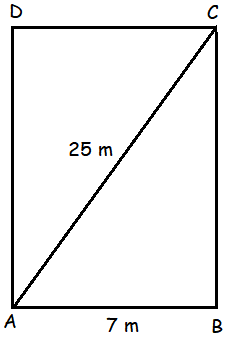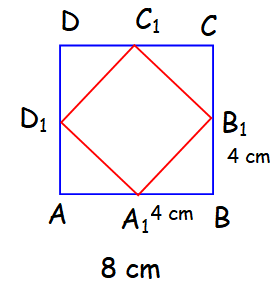7 TH GRADE MATH PRACTICE TEST WITH ANSWERS
Subscribe to our ▶️ YouTube channel 🔴 for the latest videos, updates, and tips.
Question 1 :
If the sum of a number and 4 is 2003, then the number is ?
(A) 1998 (B) 1990 (C) 1999
Solution :
Let x be the required number
x + 4 = 2003
Subtract 4 on both sides
x = 2003 - 4
x = 1999
So, the required number is 1999.
Question 2 :
The question paper in an exam consists 80 problems. James has solved 68 of them. The percentage of the problems he has solved?
(A) 50 (B) 80 (C) 85
Solution :
Total number of questions in the question paper = 80
Number of solved question = 68
Percentage of problems he has solved = (68/80) 100
= (17/20) 100
= 17(5) = 85
So, 85% of questions solved.
Question 3 :
An author of a math competition was looking through a tentative exam, when he realized that he could not use one of his proposed problems. Frustrated, he had decided to take a nap instead, and slept from 10.47 am to 7.32 pm. For how many minutes did he has sleep ?
(A) 585 (B) 620 (C) 225
Solution :
To find the number of minutes he has sleep, let us find the number of hours he has slept.
12.00 - 10.47 = 2.13
7.32
------
9.45
Number of minutes for 9 hours = 9 (60) = 540
= 540 + 45
= 585
So, the number of minutes he has sleep 585.
Question 4 :
If a rectangle ABCD has the lengths, AB = 7m and AC = 25, then its area is ?
(A) 130 (B) 150 (C) 168
Solution :

In a right triangle ABC,
AC2 = AB2 + BC2
252 = 72 + BC2
625 - 49 = BC2
BC2 = 576
BC = √576 = 24
Area of rectangle = Length ⋅ Width
= 7 ⋅ 24
= 168 m2
So, the area of rectangle 168 m2.
Question 5 :
If the diagonal of a square is 4 feet long, then the area of the square is
(A) 5 (B) 9 (C) 8
Solution :
Diagonal of a square = 4 ft
a2 + a2 = 42
2a2 = 16
a2 = 8
Area of square 8 square feet.
Question 6 :
If two angles are supplementary and one of the angles is 9 times as large as the other, what is the measure of the larger angle?
(A) 162 (B) 150 (C) 165
Solution :
Let "x" be the unknown angle
"9x" be the other angle
x + 9x = 180
10x = 180
Divide both sides by 10
x = 18
9x = 9(18) = 162
So, the measure of larger angle is 162.
Question 7 :
ABCD is a square with the length of 8 units each side. A second square A1B1C1D1 is formed by joining the midpoints of AB, BC, CD,and DA. Find the sum of the areas of these two squares
(A) 96 cm2 (B) 104 cm2 (C) 48 cm2
Solution :

Area of the square ABCD = a2
= 82 = 64 cm2
To find the area of square A1B1C1D1, we have to find the side length of A1B1
(A1B1)2 = 42 + 42
(A1B1)2 = 16 + 16 = 32 = 4√2
Area of square A1B1C1D1 = (4√2)2 = 32 cm2
Question 8 :
If p + q = 13, q + r = 14, r + p = 15, then the value of r is
(A) 6 (B) 8 (C) 5
Solution :
p + q = 13 ----(1)
q + r = 14 ------(2)
r + p = 15 ----(3)
(2) - (3)
q + r - r - p = 14 - 15
q - p = -1 ---(4)
Add 1st and 4th equation
p + q + p - q = 13 + (-1) = 12
2p = 12
p = 6
p + r = 15
r = 15 - 6 = 9
So, the value of r is 9.
Question 9 :
The number of three-digit perfect squares are,
(A) 12 (B) 19 (C) 22
Solution :
The value of 102 is 100,
The value of 182 is 324
The value of 312 is 961.
From 10 to 31, we have 22 numbers.
So, the number of three digit perfect squares are 22.
Question 10 :
A train is running at a speed of 20 m/sec.. If it crosses a pole in 30 seconds, find the length of the train in meters.
(A) 200 meter (B) 800 meter (C) 600 meter
Solution :
The distance covered by the train to cross the pole is
= Length of the train
Given : Speed is 20 m/sec and time taken to cross the pole is 30 seconds
We know,
Distance = Speed ⋅ Time
So,
length of the train = Speed ⋅ Time
Length of the train = 20 ⋅ 30
Length of the train = 600 meters
So, length of the train is 600 meters.
Subscribe to our ▶️ YouTube channel 🔴 for the latest videos, updates, and tips.
Kindly mail your feedback to v4formath@gmail.com
We always appreciate your feedback.
About Us | Contact Us | Privacy Policy
©All rights reserved. onlinemath4all.com

Recent Articles
-
Digital SAT Math Problems and Solutions (Part - 1)
Feb 05, 26 09:37 AM
Digital SAT Math Problems and Solutions (Part - 1) -
AP Precalculus Problems and Solutions
Feb 05, 26 06:41 AM
AP Precalculus Problems and Solutions -
SAT Math Preparation with Hard Questions
Feb 05, 26 05:30 AM
SAT Math Preparation with Hard Questions

